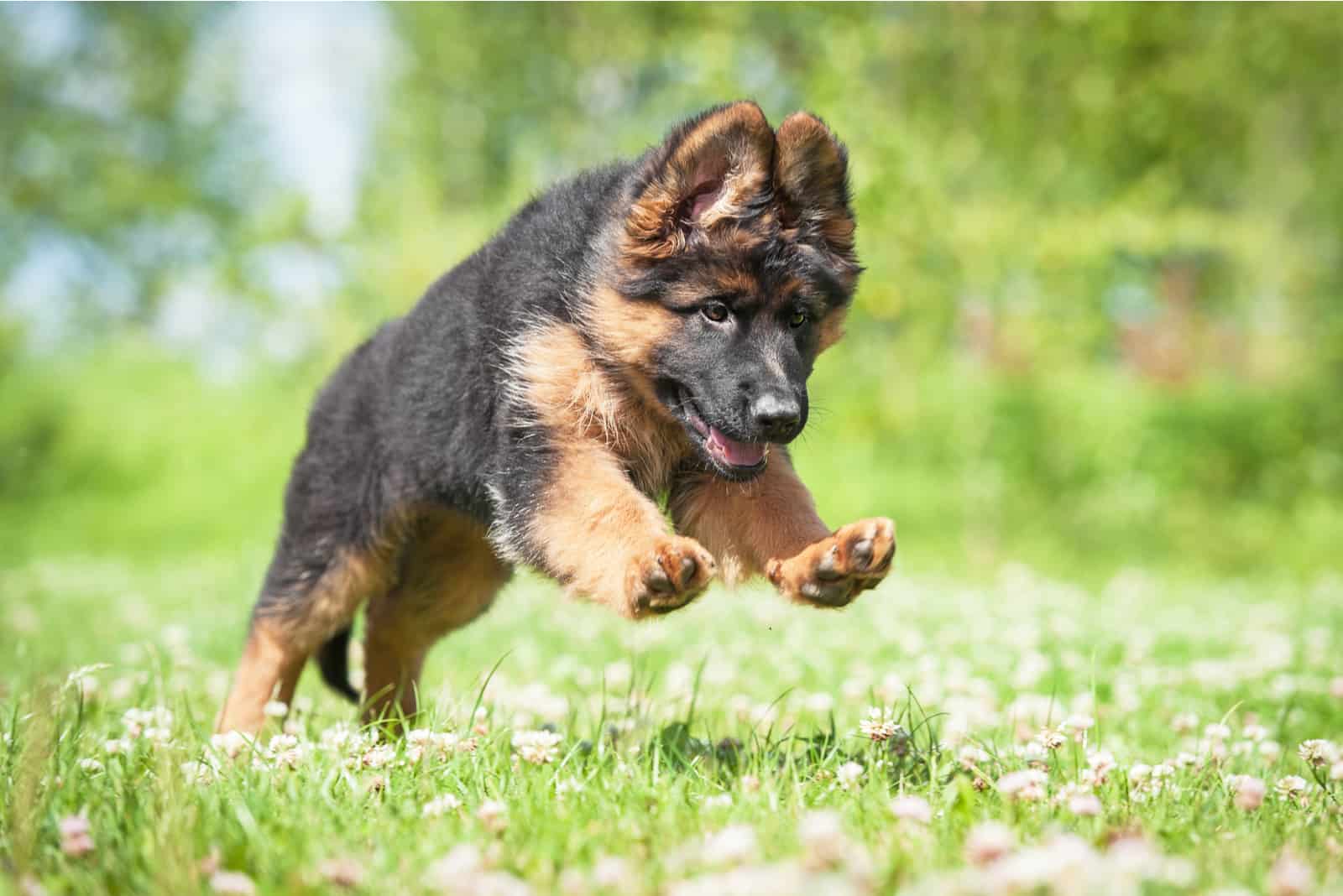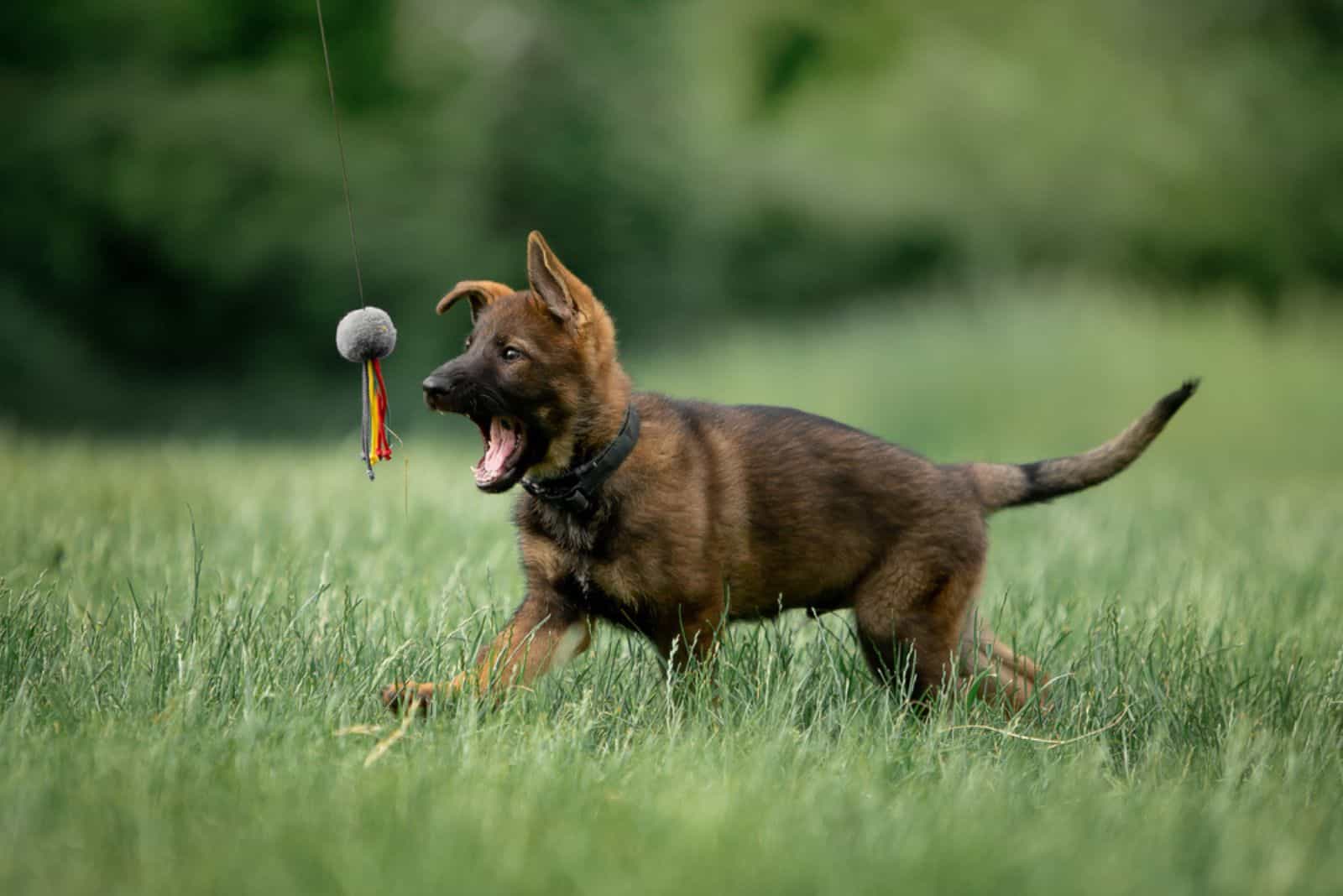One could feel a little perplexed when trying to figure out how to breed German Shepherds for the first time.
Due to their prominence in the media and pop culture, German Shepherds are still among the dogs with the highest level of recognition.
However, the breed itself has evolved from its basic working standard and is, in fact, much more diverse than it used to be. But even after decades of breeding, they still maintain their regal appearance and are devoted, determined, and hard-working friends.
If you are thinking of becoming a German Shepherd breeder, then you need to do a lot of homework and prepare for everything that is coming.
This guide is a great starting point that will cover all the basics that you need to know before embarking on this journey.
How To Breed German Shepherds

It’s crucial to be as prepared as possible for your first litter if you’re a novice breeder. Although breeding German Shepherds can be quite difficult, it can also be incredibly rewarding.
The first thing you need to be aware of is how time-consuming it is. Beyond that, it requires a lot of work and may even end in failed attempts, which is frequently devastating.
If you want to see anything through, you need to be completely committed to it and have a lot of patience. When done correctly, it will require months of preparation, planning, and organization before the breeding actually occurs.
Additionally, the cost will be high. These details are just the harsh truth of successful breeding; they are not meant to discourage you from moving forward.
Now let’s get into the more specific details of learning how to breed German Shepherds.
Do You Need A License To Breed German Shepherds?
Currently, most breeders can breed dogs without a license or authorization.
However, when a breeder has a specific number of female dogs present at once or crosses a specific number of litters in a year, several jurisdictions will want you to have an official permit.
Business and commercial breeders have different approaches to dog breeding. You must submit an application for a commercial license if you want to breed dogs for profit.
You may need to adhere to particular laws and regulations as well as fulfill particular requirements depending on the state in which you reside.
You must abide by specific regulations, such as the ability to have dogs on your land, the maximum number of dogs you can own at once, and registering your breeding stock, in order to maintain the legitimacy of your dog breeding business.
Obtaining a business permit is also necessary because it will show that your company complies with all applicable state rules and regulations.
And finally, you will need to register your pups with a reputable kennel club, such as the American Kennel Club (AKC), in order to assure your potential customers that the dogs they are purchasing are healthy and of good quality.
How To Choose The Right German Shepherd Puppy For Breeding

Once you’ve decided that you actually want to become a German Shepherd breeder, the first step is to get your first puppy.
Before buying a German Shepherd puppy, if you have any uncertainties or queries, consult breed specialists and take into account their advice. Get in touch with other breeders and ask for their advice.
Find inspiration in our list of the 10 German Shepherd Breeders In America.
You can also attend dog shows and speak with the German Shepherd owners, as well as the judges there, in order to find out what are some of the most desirable attributes and how you can make sure to pick a puppy that has them.
Along with championship titles, you should consider other aspects as well. Take into account the parents’ working abilities, temperament, and general health.
Check The Medical Records
Examine the pup’s vet records and other paperwork to learn more about its past and genealogy. Think about the genetic testing findings for the puppy’s parents.
For inherited health issues including hip and elbow dysplasia, degenerative myelopathy, and irritable bowel syndrome, to name just a few, they should have undergone routine screenings.
Research The Pedigree
Another important thing to have in mind when selecting your first puppy is that it has a strong pedigree, and if it is a full-blooded German Shepherd.
Genetics play a massive role in German Shepherd breeding, and if the parents were high-quality dogs, there’s a good chance that their puppies will be, as well.
Many dog breeders favor line breeding because it gives them a stronger guarantee that each litter of puppies will have the same appearance, temperament, and health as their parents.
Make sure the puppy you’re obtaining via line breeding is between the 12th and 14th generations.
Types Of German Shepherds
While you can opt to breed all types of German Shepherds, if you’re just starting out we recommend that you stick to one. It will be simpler to keep up and get in the swing of things before you decide to branch out and diversify.
Based on the conformation of their bodies, there are multiple different types of German Shepherds, not including the coat color variations.
There are various categorizations, but in essence, there are five distinct types: West German working line, East German working Line, Czech working line, West German show line, and American show line.
If you want a more in-depth read that includes some extra GSD types, we have a great article about it already on the site.
At What Age Can You Start Breeding A German Shepherd?

The majority of breeders want to start as soon as these dogs experience their first heat cycle.
However, you should be aware that German Shepherd puppies can suffer health risks if they are bred too early. It may also have a negative impact on the female dog’s capacity to be a good parent.
A female German Shepherd’s first heat cycle can start as early as six months of age, though it often happens around nine months.
At that age, however, she still has the mindset and routines of a puppy, and lacks the maturity and intuition necessary to properly raise a litter.
More crucially, her body isn’t nearly ready to handle the strain of nursing and pregnancy, and she could even experience a tough case of the puppy blues.
Probably the ideal time to breed female German Shepherds is when they are two to three years old, and after a female German Shepherd turns eight, breeding usually ends.
Male dog sperm similarly deteriorates with age. A male dog can continue to mate into his tenth year if given routine checkups to guarantee his health.
Health Testing Your German Shepherd
A responsible breeder will have the Orthopedic Foundation for Animals (OFA) grade the dog’s elbows and hips before using it for breeding purposes. Elbow and hip dysplasia should be screened for at least two years of age.
In addition, you should request tests for thyroid, Von Willebrand’s disease, degenerative myelopathy, and OFA eye certification.
The dog should be treated and eliminated from the breeding pool if it has a hereditary illness or genetic disease, or if it is a carrier of one.
Furthermore, a female dog that is ready to breed must have a comprehensive examination by a veterinarian at least one month before breeding. It has to be tested for parasites, dewormed, and updated on vaccinations.
How To Know That Your German Shepherd Is Pregnant

There are three methods for determining whether a dog is pregnant: palpation, ultrasound, and X-ray. We’ll go through the basics below, but here is a more detailed article if you want to know the full story.
Between 23 and 30 days after ovulation, palpation is possible. Although, identifying pregnancy in overweight or heavily muscled dogs can be challenging.
From the 21st day following ovulation, an ultrasound can also be performed. As the dog is not put under anesthesia, it is a fairly straightforward procedure that doesn’t cause any pain or discomfort to the dog.
After the 50th day of ovulation, x-rays can be used to count the heads and spines of the puppies to estimate the number of babies.
These diagnostic techniques should only be carried out by licensed veterinarians. This is critical in order to prevent a wrong diagnosis or possible harm to the embryos.
What To Do When Your German Shepherd Is Pregnant
The average dog pregnancy lasts 63 days. Give your GSD a diet that is nutritious and healthy for pregnant dogs throughout that time. By doing this, both the mommy and pups are certain to receive all the nutrients necessary for good health.
You should also always keep an eye on your pregnant female German Shepherd, to make sure that she doesn’t injure herself in any way.
Final Thoughts
German Shepherd breeding is a very difficult but rewarding task. However, even after the puppies are born, the work is not finished.
Simply knowing how to breed German Shepherds is not enough. The most reputable and reliable breeders possess extensive expertise, moral character, and a commitment to professionalism.
The effort that you put into it, however, is certainly worth it when you get your first healthy litter of cute little German Shepherds! And once you get a hang of it, you might even want to try your hand at breeding some of these cute GSD mixes.
